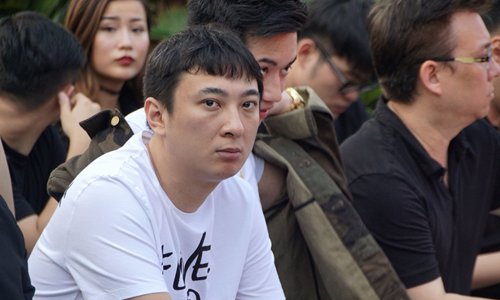Wanda scion Wang Sicong mocked and criticized for 'sexually assaulting' an internet celebrity

Wang Sicong attends a music festival in 2017. Photo: IC
Chinese tycoon and founder of Dalian Wanda Group, Wang Jianlin, is not only depressed about his hasty sell of AMC stakes just before shares shot up losing out on more than $1 billion, but also annoyed by his son's love affair that has become a laughingstock of Chinese netizens.
Wang Sicong, Wang Jianlin's son, was previously characterized by Chinese netizens as the wealthiest bachelor and "national husband."
But now he is mocked as a wealthy simpleton accused of sexual assault, after it was revealed he allegedly sent bullying messages to a woman and coerced her to be his girlfriend.
Wang, 33, has been slammed by Chinese netizens after Sun Yining, an internet celebrity aged 22, revealed screenshots on China's Twitter-like Sina Weibo platform on Tuesday of what she alleges to be chat conversations with Wang.
In the post under the screenshots, Sun said Wang coerced her to meet him to go to a pub and also sent her bullying messages despite that she had refused to be Wang's girlfriend and claimed she is lesbian.
"I drove for three hours from Shanghai to Hangzhou for you but you do not even come to see me. I have not been sleeping well for days as I miss you every night," showed the message from Wang according to the screenshots.
Wang also allegedly threatened to reveal Sun's profiting about 10,000 yuan ($1,555) from cheating advertisers and consumers in 2017, according to Sun's post.
Wang responded by revealing his chat records with Sun to the media and claimed that he did not realize that Sun is lesbian until recently as she kept pretending to be heterosexual and maintained dubious relationship with him.
At first, many Chinese netizens flooded to social media platforms to laugh at Wang, who has always had a playboy image, as the screenshots showed that he was flirting with the woman but she never returned his attention.
Wang has raised the bar for simpletons, Chinese netizens said.
However, criticism gradually dominated public opinion as some netizens pointed out that Wang's messages, which look like expression of love, are actually full of coercion out of jealousy.
"It is not simply a conflict between some internet celebrities. It is purely violence combined with money and sexual assault," said a Weibo user.
Wang thought that if he is interested in a woman, she has to say yes. He flattens and despises women while longing for them. Materializing, occupying and destroying women is the meaning of his life, read a post that went viral on social media platforms.
On Weibo, the hashtag "Wang Sicong is a horrible pursuer" has been viewed by more than 10 million times as of Thursday night. Another hashtag saying, "Please do not entertain wretched behaviors" has been viewed more than 1 million times.
To some observers, the issue is far more meaningful considering the decline of Wanda Group since 2017 due to a series failing overseas investments, which interestingly coincided with the timeline of the entanglement between Wang and Sun.
In November 2020, Forbes estimated Wang Jianlin's net worth to be $14.4 billion, a significant drop from the $31.3 billion in March, 2017.
In 2019, Wang Sicong was listed as a person subject to enforcement requiring him to repay millions in debt, which came after Beijing Pusi Investment Ltd (Prometheus Capital), in which he serves as the chairman and holds 100 percent of the shares, was frozen from October 15 to October 14, 2022 by order of a Shanghai court.
Shi Wenxue, an observer for the entertainment industry, characterized the issue as "a fall of idols."
"Not only artists, but politicians and tycoons can also be idols. Wang and his father, who was famous for his speech of 'a small target of earning 100 million', as well as Alibaba founder Jack Ma Yun, who is called Daddy Ma by China's young and ambitious, all used to be characterized as idols to some extent on Chinese social media, but all fell now," Shi said.
Followers molded these people into idols, but when they really came down to earth, they fall from their pedestals, Shi said.
